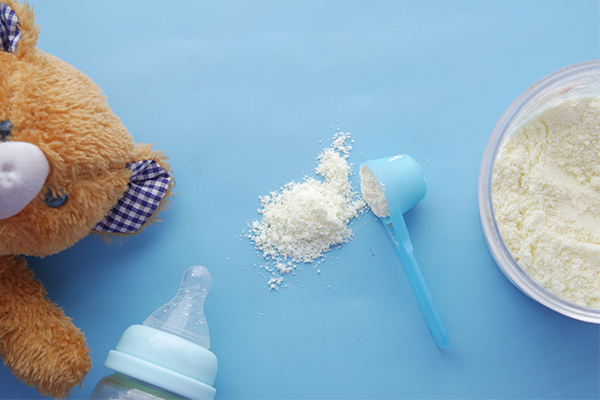Disclosure :: This post is sponsored by Ochsner Health and written by Dr. Bryan Sibley. If you have been watching the news you know that the infant formula shortage has been a hot topic. We are happy to have Dr. Sibley share what every mom should know on this important topic!
Infant Formula: What Every Mom Should Know!
As a new mom, or even a veteran one, deciding how or what to feed your baby can be a daunting task. Moms often ask themselves questions like: What nutrients does my baby need? What should I feed my baby? Why is this product better than this one? Concerns like these flood the minds of already sleep-deprived parents who are tired of combing through Google for the right answer.
I’m here to help. Let’s review the basics and varieties of infant formula, look at common questions related to selecting infant formula for your baby and address the current formula climate.
What is infant formula?
Simply, formula is a food designed to feed babies and infants less than 12 months. A substitute for mother’s milk, formulas are normally prepared for bottle-feeding most of the time in a powdered form that’s mixed with water or another liquid (like breastmilk). I recommend any of the commercial cow’s milk, protein-based formulas. (Formula is typically made from cow’s milk and then treated to make it more suitable for babies.)
There are two main forms of infant/newborn formula: a dry powder or a ready-to-use liquid formula. Which you use is really a matter of preference and affordability. Ready-to-feed formulas may be more convenient, but they are more expensive and once opened, need to be used more quickly than powder-based formulas. The good news is, if mixed properly, the final product is exactly the same. In addition, there is a concentrated liquid formula as well, and this type also must be mixed with water before feeding it to baby.
Types of Infant Formula
There is a variety of formula types and which you use will ultimately depend on your baby’s needs. When comparing brand and/or non-brand name formulas, it’s a good idea to look at the type of base protein, the number of calories and the concentration of other ingredients. If these are all the same, then a non-brand name formula is a safe alternative.
Here’s a quick breakdown of common types of formula:
| Cow Milk Protein-Based (most common) | Made from cow’s milk and altered to resemble breastmilk; easy to digest |
| Soy-Based | Made for babies who are intolerant/allergic to cow’s milk formula or lactose, or if you want to exclude animal protein from baby’s diet. Note: Babies allergic to cow’s milk may also be allergic to soy milk. |
| Protein Hydrolysate | Contains protein that’s been broken down partially (into smaller sizes). Meant for babies who can’t tolerate cow’s milk or soy-based formulas or have protein allergies. |
Current Formula Climate
In February, an Abbott Nutrition facility in Sturgis, Michigan closed following two deaths and four hospitalizations that were linked to bacterial contamination. This caused the formula that was produced by the plant to be recalled. Coupled with an already weakened supply chain, this shortage didn’t bode well for moms across the country. Thankfully, it’s almost over. Production is ramping up again and the shortage is expected to be over in July 2022.
I’ve been so proud of so many parents who have demonstrated tremendous resourcefulness in this regard.
Here are some things you can do if you find yourself needing formula:
- Ask family members or friends in other communities to seek out formula on your behalf
- Co-opting leftover formula – i.e., parents have switched brands and have leftovers of the original brand. Just be sure to check expiration dates.
- Searching online retailer inventory
If none of these are successful, parents should visit with their pediatrician for next steps.
But What About Homemade Formula?
A little-known fact about why infant formula is called “formula” – the product is the outcome of a process based on the best formula or recipe for proper nutrition in the first year of life. Infant formula is designed to provide the proper amounts of all nutrients for infants to not only grow properly, but also to develop normally. Having said that, the problems with homemade formula are that these products may actually cause more harm to an infant’s growth and development than they would do any good. I want to reiterate that human breastmilk or commercially prepared formula should always be the primary source of nutrition for babies until their first birthday. Substituting other items can lead to both temporary and permanent harm to infants and children and should not be attempted.
Knowing the facts and keeping an open line of communication with your pediatrician will help with decision-making when it comes to infant formula or your child’s health overall. To schedule an appointment with Dr. Sibley, visit Ochsner.org/doctors/bryan-sibley or Drsibley.com.
About Dr. Sibley
Bryan G. Sibley, MD, is a board-certified pediatrician who has been practicing in Lafayette, La. for more than 25 years. He is the past president of the Louisiana Chapter of the  American Academy of Pediatrics and is past chairman of the St. Thomas Moore High School Advisory Council. Throughout his career, Dr. Sibley has also served his community, his hospital staff, and his professional associations in a variety of leadership roles, including Pediatric Department Chief at Ochsner Lafayette General Medical Center. He is on the clinical faculty at the LSU School of Medicine in New Orleans, as well as the LSU School of Allied Health in Shreveport. He currently serves as the medical director for Ochsner Lafayette General Pediatrics and is the course director for the Inpatient Pediatrics Rotation for the LSU School of Medicine Family Medicine Residency Program. Dr. Sibley has a special interest in the care of children with special healthcare needs, as well as all aspects of pediatric practice management. As a speaker, writer, and preacher he is known for his humor and insight. Dr. Sibley and his wife, Shelley have been married for 33 years. They have three children and one perfect grandson. During his free time, Dr. Sibley enjoys exercising, reading and, along with his wife, supporting their children in all their various activities.
American Academy of Pediatrics and is past chairman of the St. Thomas Moore High School Advisory Council. Throughout his career, Dr. Sibley has also served his community, his hospital staff, and his professional associations in a variety of leadership roles, including Pediatric Department Chief at Ochsner Lafayette General Medical Center. He is on the clinical faculty at the LSU School of Medicine in New Orleans, as well as the LSU School of Allied Health in Shreveport. He currently serves as the medical director for Ochsner Lafayette General Pediatrics and is the course director for the Inpatient Pediatrics Rotation for the LSU School of Medicine Family Medicine Residency Program. Dr. Sibley has a special interest in the care of children with special healthcare needs, as well as all aspects of pediatric practice management. As a speaker, writer, and preacher he is known for his humor and insight. Dr. Sibley and his wife, Shelley have been married for 33 years. They have three children and one perfect grandson. During his free time, Dr. Sibley enjoys exercising, reading and, along with his wife, supporting their children in all their various activities.



















